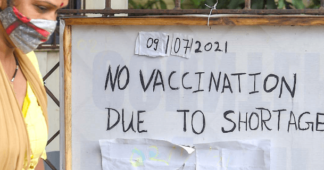Health activists and scientists in Europe met to develop strategies to build regional public pharmaceutical infrastructure as pandemic lessons seems lost on governments and producers
March 20, 2024
As the World Health Organization (WHO) advances into the final stage of negotiations on the Pandemic Treaty, a divide that appeared at the beginning of the COVID-19 pandemic persists. High-income countries are resisting calls for an equity-based mechanism, with proposals largely influenced by pharmaceutical companies’ interests. This dominance threatens to compromise global preparedness for future pandemics.
In the four years following the declaration of COVID-19 as a public health emergency, major pharmaceutical firms and their allies have been unrelenting in their efforts to fend off reforms aimed at overhauling the existing framework for medicines’ research, development, and distribution. Speaking at the Public Pharma for Europe conference in Brussels on March 15-16, Nicoletta Dentico from the Society for International Development (SID) emphasized the unsustainable nature of the pharmaceutical industry’s current monopoly. “Public health is too important to be left in the hands of the private sector,” Dentico argued.
Instead of giving in to a Pandemic Treaty that will perpetuate the status quo, right to health groups should continue to push for an alternative vision of access to medicines based on public pharmaceutical infrastructure, she said. “We should all be engaged and united in order to build the public pharma infrastructure we need to meet the next pandemic.”
Her call was echoed at the conference, attended by over 140 activists, scientists, and health workers, aiming to build a pharmaceutical system for Europe that is more democratic and inclusive. Proposals for achieving such a vision include relying on open science for transparency and affordability, adopting public-interest research and development models, and ensuring accessible information and data.
Economist Massimo Florio suggested that with an investment of as little as 5 billion euros, Europe could have access to a “treasure trove” of medicines within a decade. Projections by others, such as Tim Joye and Wim De Ceukelaire of Médecine pour le Peuple, estimate that much more will be necessary to challenge the existing private pharmaceutical infrastructure effectively through a network of Salk Institutes.
Despite different budgetary estimates, activists agree that a shift in the pharma industry’s mission, governance, and financing would yield enormous benefits, including prioritizing medical needs over profit margins. Such reforms would not only transform the European healthcare landscape but also extend its positive impact globally, addressing issues of international solidarity and high drug prices.
“The issue of public pharma is also an issue of international solidarity. High drug prices and the ban on local production of certain medicines protected by patents mean that billions of patents are deprived of certain medicines,” said Evia Yalenga from the organization Si Jeunesse Savait.
There already is widespread documentation of the problems associated with the current intellectual property model, but concrete action has been slow. The challenge now, as Leigh Haynes from the People’s Health Movement (PHM) Europe pointsed out, is transitioning from understanding the “why” to implementing the “how.” Initiatives like Abundance’s exploration of a public-common partnership model illustrates the growing demand for change, highlighting the importance of grassroots, community involvement in pharmaceutical decision-making.
Examples of successful policies, such as Brazil’s efforts to enhance public-sector vaccine production, demonstrate the potential of top-down approaches as well. “Public production requires long term investments by the state and is vulnerable to external and internal political changes,” said Koichi Kameda, postdoctoral fellow at Fiocruz, yet Brazil’s efforts to navigate this landscape today show the benefits of pursuing such a path.
But the result is often best when bottom-up and top-down meet, giving room to the people and governments to define priorities independently of the industry. Such occurrences are rare, but smaller breakthroughs give reason for cautious hope. In Spain, pressure from health rights groups influenced the government’s decision to pursue a public-private partnership for CAR-T therapy development, showing the importance of stubborn pressure from access to medicines groups.
Irene Bernal from Salud por Derecho warned that there are still many questions and doubts surrounding this initiative – including crucial ones, like who the private entities involved are – but pointed out that without continuous advocacy by civil society, it might just have been that the private sector would have had the final say over everything.
However, such breakthroughs should not give room to complacency among activists and researchers. Much more than a set of small steps will be necessary to overhaul the current system, said commons researcher and activist Gaëlle Krikorian. “We cannot count on the courage of politicians because [something] is logical [to us]. The only way they’ll do it is because they get huge pressure to change.”
“Health equity and access are not optional – they must be the purpose from the start. Affordability is not just about price or cost – it’s about political economy, the social contract, and financing for health,” said bio-engineer and access advocate Els Torreele.
As the world continues to struggle with the lessons of the COVID-19 pandemic, the push for systemic change as described by Torreele remains imperative; but it remains to be seen if it will succeed to make the move from the why to the how on time.
We remind our readers that publication of articles on our site does not mean that we agree with what is written. Our policy is to publish anything which we consider of interest, so as to assist our readers in forming their opinions. Sometimes we even publish articles with which we totally disagree, since we believe it is important for our readers to be informed on as wide a spectrum of views as possible.











